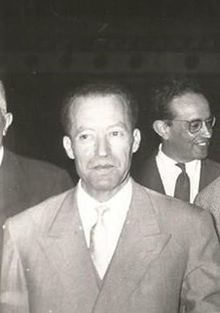Mahmoud Messadi
Mahmoud Messadi محمود المسعدي | |
|---|---|
 | |
| Born | 28 January 1911 |
| Died | 16 December 2004 (aged 93) |
| Occupation | Novelist and intellectual |
Mahmoud Messadi (Tunisian Arabic: محمود المسعدي; 28 January 1911[1]– 16 December 2004) was a Tunisian author and intellectual. He is one of the most prominent Tunisian novelists of the 20th century.
Life and Education[]
Messadi was born in Tazarka, Nabeul Governorate, Tunisia. His education began in the village Quranic school, where he memorized part of the Qur’an before starting primary school in Qirba. He then completed high school in the Sadiqi Institute in Tunis in 1933. In the same year, he enrolled at the Sorbonne University in Paris to study Arabic language and literature.[1] He graduated in 1936, then began preparing his first PhD dissertation on Abu Nuwas as well as a second on the rhythm of classical Arabic poetry. He finished the first dissertation but the Second World War prevented him from defending it.[2] The second was later published in Arabic and French.[3] He started teaching at the Islamic Studies center in Paris in 1952.[1]
Government Work[]
In addition to teaching at university in both Tunisia and France, Messadi was involved in politics. He assumed responsibility for educational affairs in the National Independence Movement, in which he joined in the fight against French colonialism. He also played a leadership role in the teachers' union.[3]
Messadi participated in the negotiations with France for Tunisia's independence in 1955.[1] Following independence, Messadi served as a member of parliament from 1959 until 1981. He was the leader of parliament from 1981 to 1986.[1]
Messadi took over the Ministry of National Education, where he founded the Tunisian University.[citation needed] Before that, he had been able to establish free education for every Tunisian child.[citation needed]
He was Ministry of Cultural Affairs from 1973–1976.[1]
In addition to these responsibilities, the writer had a wealth of activity in the UNESCO and Alexo organizations and the Arabic Language Academy in Jordan.[1]
Literary career[]
Messadi established two magazines: al-Mabahith (Investigations) and al-Hiyaat al-Thiqaafiyya (Cultural Life), which is still issued by the Ministry of Culture.[2]
Messadi wrote his important works between 1939 and 1947. These works reveal the Qur'anic influence on his intellectual and belief formation and his style. His works also reveal his knowledge of the work of Muslim thinkers of various eras, and especially the ancient Arab literature that had interested him since high school. His speciality was his ability to combine this knowledge of the rich Arabo-Islamic tradition with his extensive knowledge of Western literature and philosophy, particularly French.
One of his most influential works, al-Sudd ('The dam') was written in 1940 but not published until 1955.[4] The novel tells the story of Ghaylan and his wife Maymuna, who come upon a valley full of people who worship a goddess of drought named Sahhaba. Ghaylan decides to build the people a dam, to give them a reliable source of water and cure them of their superstitions, with disastrous results.[4][5] This novel is recognized for "the extreme elegance of its language,"[4] which is classical yet clear, as displayed in this work: "The high literary quality of Al-Sudd resides in its pristine clarity of expression, its stylistic echos of the Koran, and its skillful recuperation of Tunisian literary heritage."[5]
Works[]
- Abu Hurairah Said (1939), translated to German in November 2009[3]
- The Dam (1955/1940), translated to German in October 2007
- Birth of the Oblivion (1945), translated to French in 1993 and to German in 2008
References[]
- ^ Jump up to: a b c d e f g "محمود المسعدي" [Mahmoud Messadi]. www.aljazeera.net (in Arabic). 2014-10-19. Retrieved 2021-03-04.
- ^ Jump up to: a b الرياحي, كمال (2012-07-15). "محمود المسعدي أيقونة السرد التونسي" [Mahmoud Messadi: An Icon of Tunisian Prose]. Aljazeera (in Arabic). Retrieved 2021-03-04.
- ^ Jump up to: a b c Presentation of the book Abu Hurairah said in Aljazeera
- ^ Jump up to: a b c Allen, Roger (1995). The Arabic Novel: An introduction and critical history (2nd ed.). Syracuse, NY: Syracuse University Press. pp. 48–49.
- ^ Jump up to: a b Fontaine, Jean; Slama, Mounir B. H. (1992). "Arabic-Language Tunisian Literature (1956-1990)". Research in African Literatures. 23:2: 183–193 – via JSTOR.
- Tunisian writers
- 1911 births
- 2004 deaths
- Presidents of the Chamber of Deputies (Tunisia)
- Tunisian people stubs
- North African writer stubs